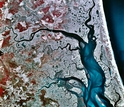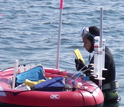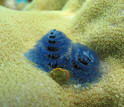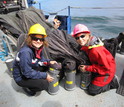News Release 17-011
Scientists present El Niño, other long-term ecological research results at annual aquatic sciences meeting
Topics include effects of the 2015-16 El Niño, carbon burial in aquatic ecosystems, pharmaceuticals in streams
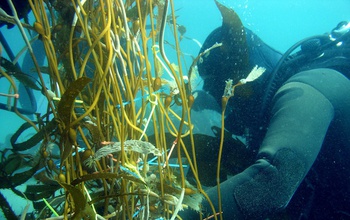
At NSF's Santa Barbara Coastal LTER site, a scuba diver records data on giant kelp growth.
February 3, 2017
This material is available primarily for archival purposes. Telephone numbers or other contact information may be out of date; please see current contact information at media contacts.
The ecological effects of the strong 2015-2016 El Niño. Carbon burial in aquatic ecosystems. The presence of pharmaceuticals in streams.
These are just a few of the topics scientists affiliated with the National Science Foundation (NSF) Long-Term Ecological Research (LTER) Network will discuss at the upcoming Association for the Sciences of Limnology and Oceanography (ASLO) annual meeting, Feb. 27 to March 3.
Researchers funded by NSF's Division of Ocean Sciences, Division of Environmental Biology and Office of Polar Programs conduct research at 25 NSF LTER sites around the world, including in aquatic ecosystems such as coral reefs, seagrass beds and salt marshes. LTER scientists study the factors driving environmental change, and map the potential ecosystem responses that could result.
Their presentations at ASLO will address social and ecological changes; ecosystem vulnerability, resilience and adaptability; and why long-term data are essential to understanding and predicting future responses to natural and human-caused environmental changes.
A special session will bring researchers together to report on the effects of the El Niño of 2015-2016, among the strongest environmental events on record in the Pacific Ocean. El Niño affected species from tropical coral reefs to northern plankton communities. The results offer insights into the future responses of marine ecosystems to such events.
Links to these and other NSF LTER presentations at ASLO are listed below. The meeting will be held in Honolulu.
For more on NSF LTER research results, please see NSF LTER Discovery Article Series.
Monday, Feb. 27
Trait-Based Approach to Food-Web Interactions Across Environmental Gradients
Effects of Algal Biofilm Patchiness on Boundary Layer Hydrodynamics
Tuesday, Feb. 28
Wednesday, March 1
Challenges of Connectivity Within Urban Landscapes: Examples from the Baltimore Ecosystem Study
Leveraging Contextual Data to Improve Machine-Learning Classifications of Marine Zooplankton
Thursday, March 2
Coral Reef Oases in Space and Time
Comparing Modern Carbon Burial in Aquatic Ecosystems
Friday, March 3
Ecological Impacts of El Niño 2015-16
Impact of Nutrient Enrichment on Coral Bleaching, Mortality and Recovery During the 2015-16 El Niño
Response of the California Current Pelagic Ecosystem to El Niño 2015-2016
-NSF-
-
Creek banks supply critical sediment to the salt marshes of NSF's Plum Island Ecosystems LTER site.
Credit and Larger Version -
Researchers measure nitrogen in seagrass meadows at the NSF Virginia Coast Reserve LTER site.
Credit and Larger Version -
The Christmas tree worms pictured here inhabit a reef in NSF's Moorea Coral Reef LTER site.
Credit and Larger Version -
NSF California Current Ecosystem LTER site scientists deploy a zooplankton sampling system.
Credit and Larger Version -
Researchers at NSF's H.J. Andrews Forest LTER site collect water quality data.
Credit and Larger Version
Media Contacts
Cheryl Dybas, NSF, (703) 292-7734, email: cdybas@nsf.gov
Peter West, NSF (Polar Regions LTER Sites), (703) 292-7530, email: pwest@nsf.gov
Marty Downs, LTER Network, (805) 893-7549, email: downs@nceas.ucsb.edu
Related Websites
NSF awards rapid response grants to study current El Niño, one of the strongest on record: https://www.nsf.gov/news/news_summ.jsp?cntn_id=137507
The U.S. National Science Foundation propels the nation forward by advancing fundamental research in all fields of science and engineering. NSF supports research and people by providing facilities, instruments and funding to support their ingenuity and sustain the U.S. as a global leader in research and innovation. With a fiscal year 2023 budget of $9.5 billion, NSF funds reach all 50 states through grants to nearly 2,000 colleges, universities and institutions. Each year, NSF receives more than 40,000 competitive proposals and makes about 11,000 new awards. Those awards include support for cooperative research with industry, Arctic and Antarctic research and operations, and U.S. participation in international scientific efforts.
Connect with us online
NSF website: nsf.gov
NSF News: nsf.gov/news
For News Media: nsf.gov/news/newsroom
Statistics: nsf.gov/statistics/
Awards database: nsf.gov/awardsearch/
Follow us on social
Twitter: twitter.com/NSF
Facebook: facebook.com/US.NSF
Instagram: instagram.com/nsfgov



